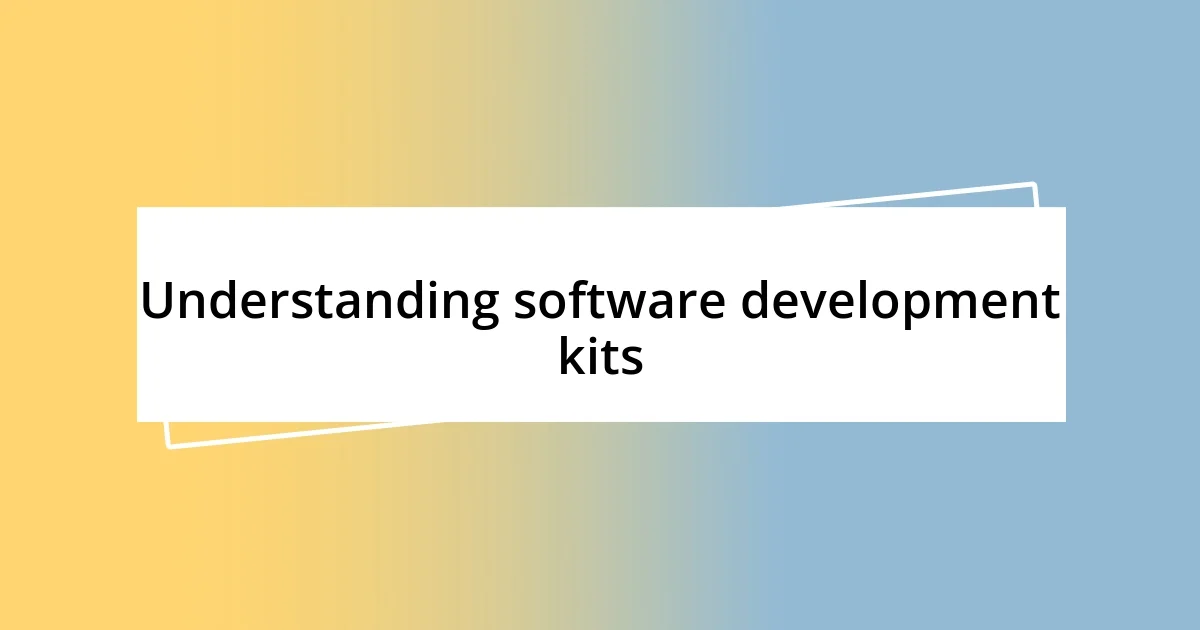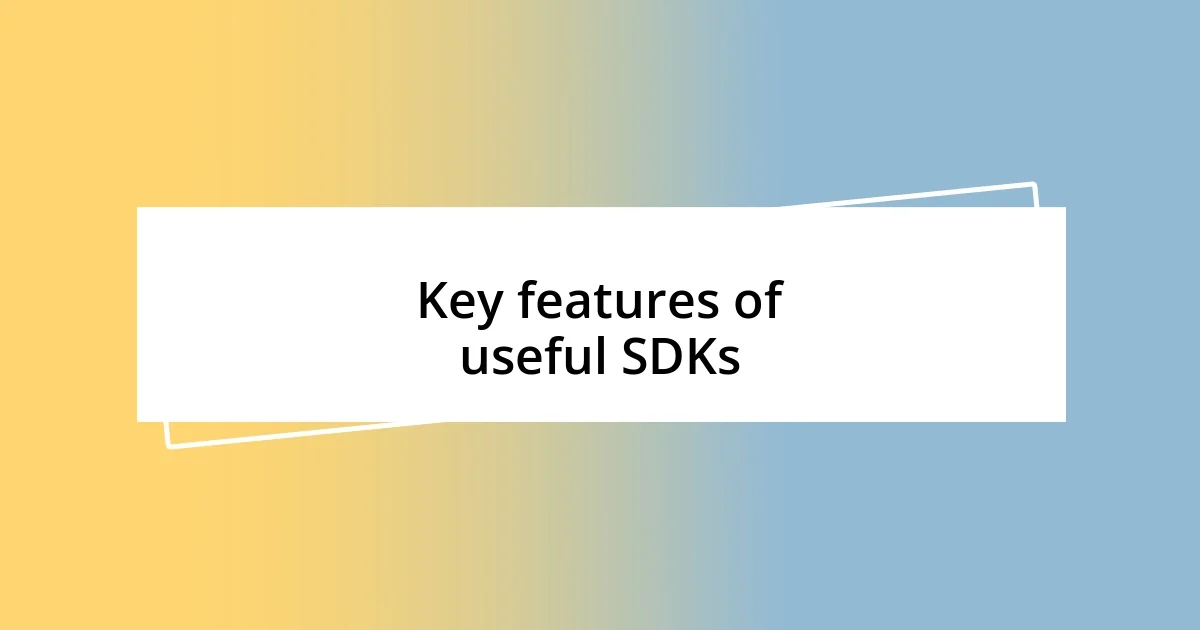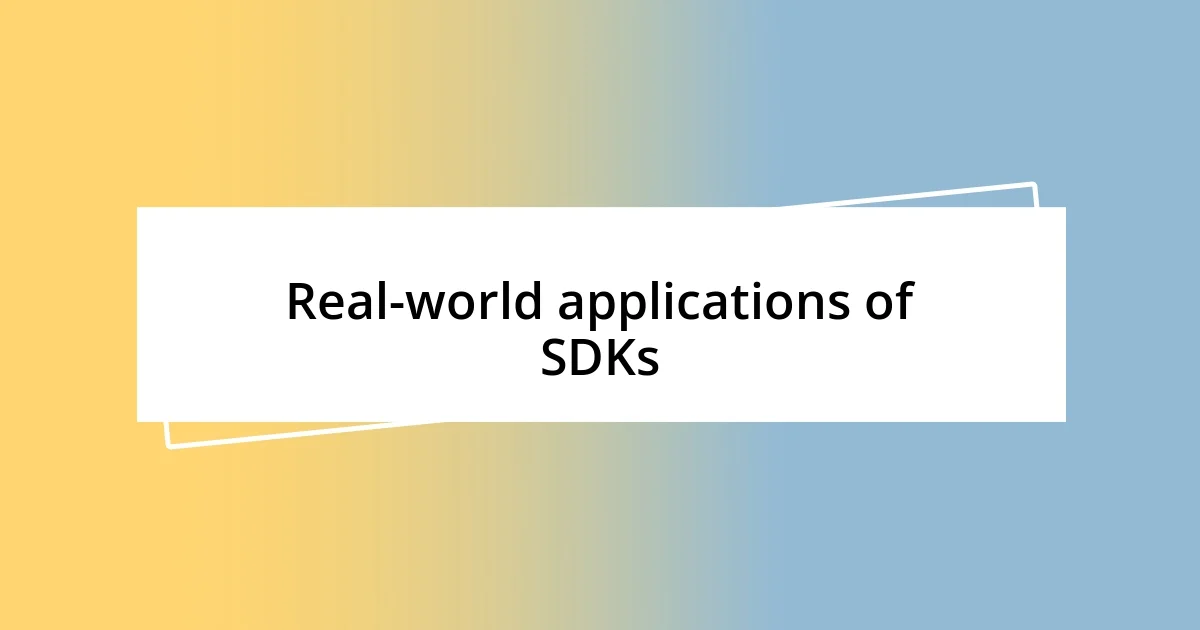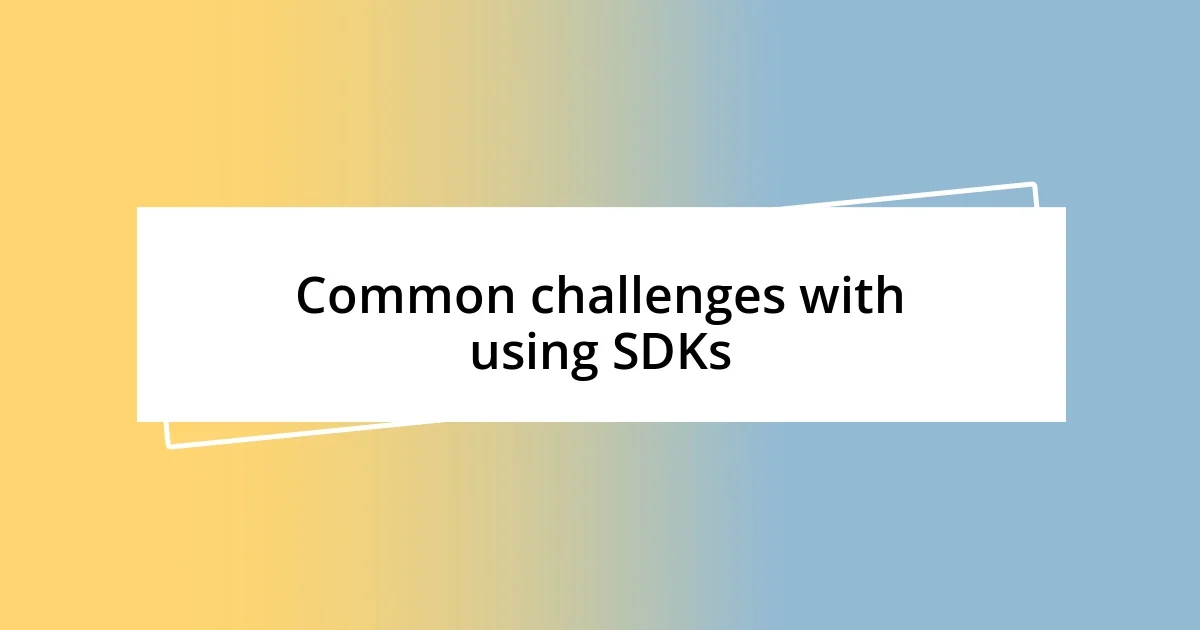Key takeaways:
- SDKs serve as essential tools that simplify the development process, providing built-in functions and supportive documentation.
- Key features of useful SDKs include comprehensive documentation, active community support, compatibility, robust error handling, and regular updates.
- Common challenges include compatibility issues, a steep learning curve, and the importance of evaluating long-term support for sustained project success.

Understanding software development kits
Understanding software development kits (SDKs) can feel like peeling back the layers of a complex onion. For me, the first time I dove into an SDK, it was a mix of excitement and apprehension. I remember being thrilled yet overwhelmed by the abundance of tools, libraries, and documentation at my fingertips. Have you ever had that jolt of realization that you’re about to embark on something transformative?
SDKs serve as a bridge between your raw ideas and the final product. In my experience, using an SDK streamlined my coding process significantly. I was particularly fascinated by how the built-in functions and sample codes drastically reduced my development time. It’s like having a seasoned mentor guiding you through the intricate world of coding—don’t you just love it when someone else has already charted the course?
However, it’s essential to recognize that SDKs also come with a learning curve. I once spent hours navigating documentation that seemed more like a labyrinth than a guide. Have you ever found yourself lost in tech jargon, wondering if you’d ever find your way out? Yet, each moment spent grappling with challenges deepened my understanding and made the victory of successfully implementing a feature all the more sweet.

Key features of useful SDKs
When I think about what truly makes an SDK valuable, a few standout features come to mind. For me, intuitive documentation and a supportive community can make all the difference. A well-organized guide filled with examples not only helps clarify concepts but also inspires confidence as you navigate new tools. It’s like having a compass in unfamiliar territory.
Here are the key features of useful SDKs:
- Comprehensive Documentation: Clear explanations, tutorials, and code samples that address different skill levels.
- Active Community Support: Access to forums, user groups, or subreddits where developers share knowledge and troubleshoot together.
- Compatibility and Integration: Ability to seamlessly work with various platforms and languages, saving time in development.
- Robust Error Handling: Built-in features that swiftly handle problems, providing meaningful feedback for troubleshooting.
- Regular Updates and Maintenance: Consistent updates to improve functionality, ensure security, and adapt to industry changes.
I remember integrating an SDK for a mobile app project and being pleasantly surprised by the community forum’s vibrancy. One developer’s post about a challenge I faced resonated with me so deeply; it became my “aha” moment. Their solution not only helped but also expanded my perspective on problem-solving in coding. It’s this interconnectedness that can turn SDKs from mere tools into gateways of learning and growth.

Real-world applications of SDKs
SDKs have truly transformed how we create and integrate software solutions, leading to a plethora of real-world applications. For example, during my time developing an e-commerce app, I utilized an SDK for payment processing. Without it, integrating payment methods would have been a daunting task. The SDK provided pre-built functions, making it straightforward to implement secure transactions. I can still recall the relief I felt when I finally tested the payment feature, and it worked flawlessly.
In the realm of mobile development, SDKs have become essential for creating feature-rich applications. A memorable project of mine involved building a social media app where the SDK handled in-app messaging. Initially, I was concerned about managing such a complex feature on my own, but the SDK not only simplified the process but also offered real-time chat capabilities almost effortlessly. It was like receiving a cheat code that unlocked a whole new level of functionality!
Moreover, SDKs play a vital role in game development, as I discovered while creating a simple game with a graphics SDK. My experience with that SDK changed my perspective on what was possible in my projects. I was amazed by the ease with which I could implement animations and graphics effects. The result? A visually appealing game that I could share with friends! It’s incredible how far SDKs can propel our capabilities in various fields.
| Application Type | SDK Example |
|---|---|
| E-commerce | Payment Processing SDKs |
| Mobile Development | Messaging SDKs |
| Game Development | Graphics SDKs |

Common challenges with using SDKs
Using SDKs can sometimes feel like navigating a maze, especially when dealing with compatibility issues. I remember integrating an SDK into a project where the library was only partially compatible with my tech stack. It was frustrating to see promising features that I couldn’t use. Have you ever faced similar hurdles? It’s a real headache when everything seems like it’s going well, and then compatibility issues throw a wrench into your plans.
Another common challenge I’ve encountered is the learning curve associated with new SDKs. There’s often a mix of excitement and anxiety when approaching unfamiliar documentation. I once spent hours pouring over a dense guide, trying to decipher how to implement a specific function. It felt overwhelming, like staring at an intricate puzzle without knowing where to begin. Has that ever happened to you? I’ve found that sometimes simply reaching out to the community leads to quicker understanding and resolution.
Lastly, something that can be overlooked is the issue of long-term support and maintenance. I integrated a fantastic SDK that worked perfectly for a while, but over time, updates became infrequent. This left me in a tough spot when newer platforms emerged or compatibility issues arose. It’s daunting to realize that the tool you relied on may not keep up with technological advancements. This makes me wonder—how crucial do you think it is to evaluate the ongoing support of an SDK before committing to it? I’ve since learned that a thorough assessment is essential for long-term project success.














